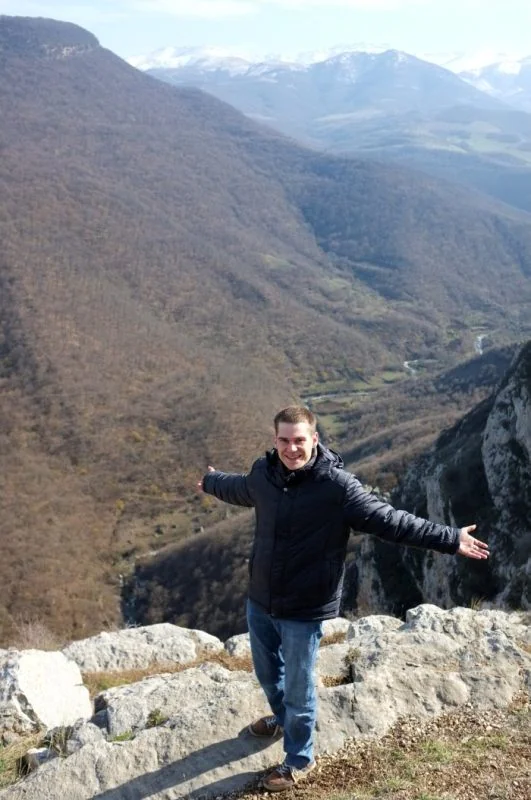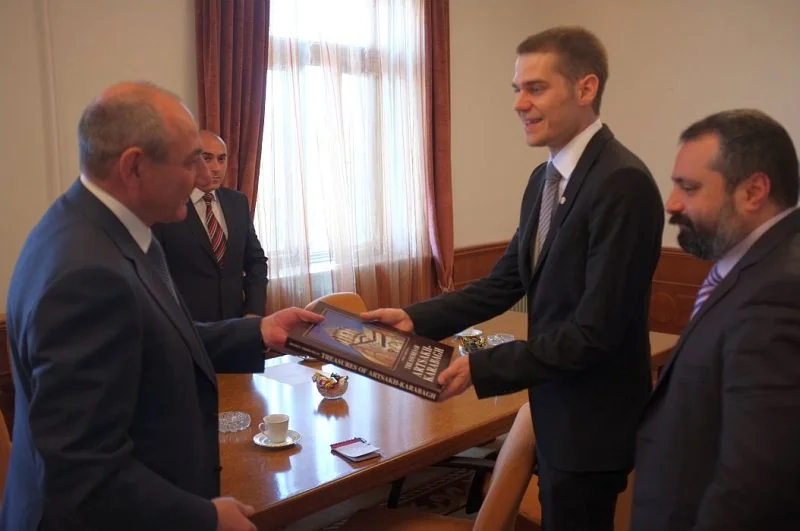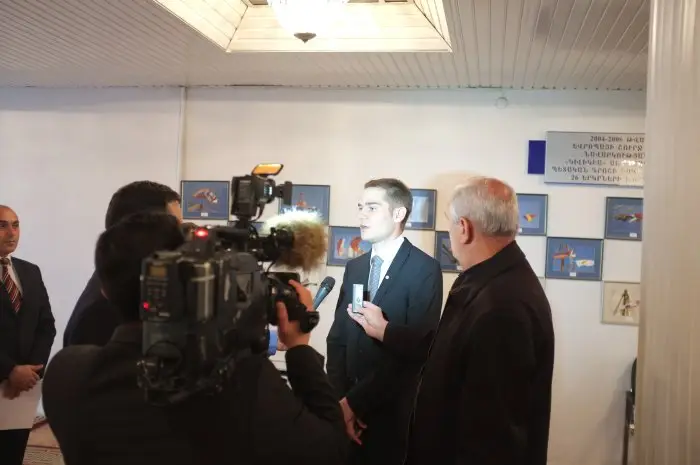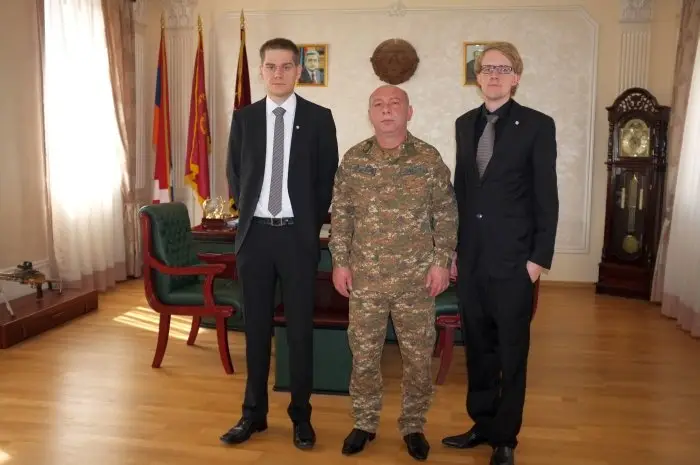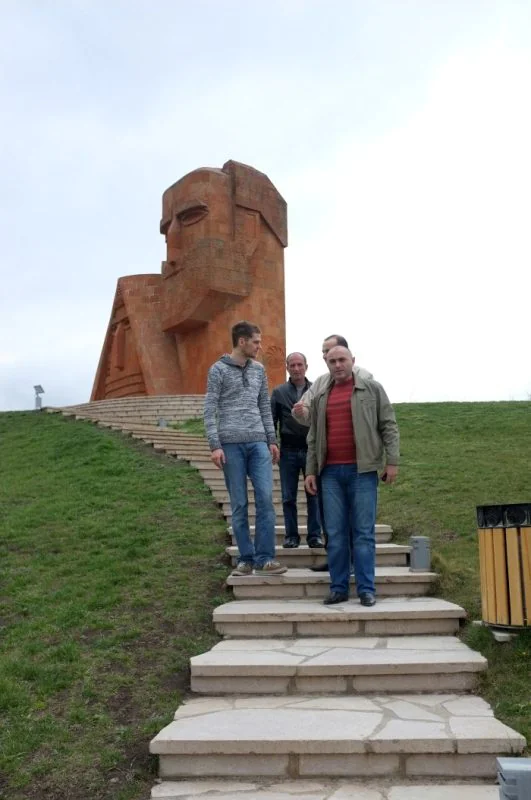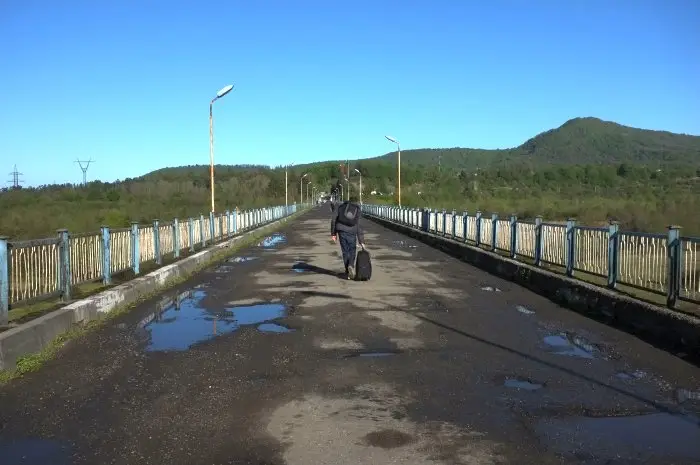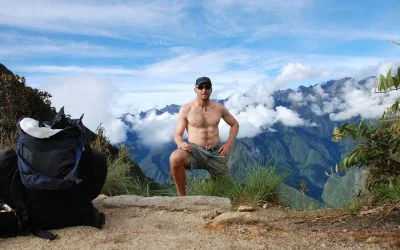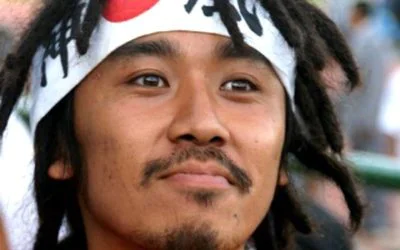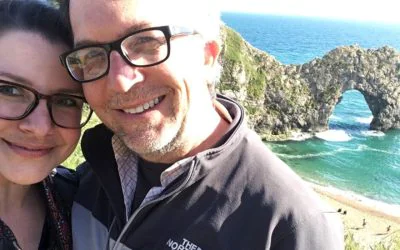We invite you to read the interview with Sascha Duerkop, CONIFA General Secretary. In it, you can find everything you need to know about this organisation and its activities. And there are many.
Sascha, you are the General Secretary of CONIFA. Can you tell us a little about your organisation and its aims?
The Confederation of Independent Football Associations (CONIFA) is a global football governing body that arranges football matches and tournaments of representative teams outside FIFA. In that function we are like an “add-on” to FIFA. Even though football outside FIFA is not that well-known, its history is even older than that of FIFA itself. National entities, that are not UN-recognized countries, like the Basque County or Catalonia, play against each other since at least 1913.
The idea behind it is that people everywhere in the world do not necessarily identify themselves with the UN-recognized country they live in, but with some entity that is in some way different. This can be an ethnicity, an isolated territory (like an island), a region or an independent country that just is not recognized by the United Nations.
Historically, FIFA did partially respect that by accepting the Faroe Islands, the Bahamas, Tahiti or Palestine join FIFA as a full member. However, this changed over time and FIFA is now restrictive to any new applications and asked all their (new) members to be UN-recognized countries. This leaves new independent nations that lack recognition, like Abkhazia, Transnistria or Northern Cyprus, minorities like the Romani People or isolated territories like the Isle of Man, out of the global football world and isolates them even more. In fact, many of those places are even “blank spots” on the global map and a player that is born there has no chance to ever represent any nation in the FIFA-system.
We, on the other hand, think that it is very important for every single individual in the world, to have a free choice of representation and identification. No one, neither the United Nations nor FIFA, can force someone to “feel” the citizenship they got “dictated”. Furthermore, many of those entities are often overlooked and/or oppressed and only are part of the global headlines if some political events, usually negative ones, occur. However, in the end they are people like you and me, who deserve to be seen and listened to just like everyone else. For that reason we felt that it is important to build a platform where they come together, meet each other, exchange their stories and, most importantly, tell the world about their existence! One of our foremost aims is to raise the awareness of our members and give them a platform to present themselves to a global audience. We want to give them the unique chance to show the world what they identify with.
With major media following us globally, we were already able to reach an audience of several hundreds of millions of readers in all corners of the globe and told them the story of Darfur, Abkhazia or the Sapmi people. And we did so by not pointing to the problems, conflicts or political problems they have, but by showing their people, represented by their national team, just as they are!
What makes us proud is that you now find a report about football and fair play on the very top of the Google results if you search for “Abkhazia” and not only reports and articles about a war that happened more than 20 years ago. We are deeply convinced that this gives everyone a far more realistic idea of Abkhazia and the Abkhazian people!
What drew you to be interested in this position?
This is actually a crazy story. During my studies at the university, I started to collect football shirts of countries inside and outside FIFA. Today I have one of the biggest collections of international football shirts in the world and a network of thousands of people inside the “business side of football”. This lead to the fact that I somehow got one of the “best connected people in football outside FIFA” as I was in a steady contact with most of the teams that are members of CONIFA today. One day the whole former organization of football outside FIFA collapsed and a friend of mine, CONIFA president Per-Anders Blind, was asked by some teams if he would like to build a new organization from the scratch. He accepted the challenge and instantly contacted me to help him by using my network. I was very keen to get involved, but lacked all funds at that time, so Per-Anders invested his private money to get me over to the Isle of Man and arrange a first “kick-off meeting” together with several teams there. From this day on I am the general secretary of CONIFA and it always was a pleasure to be.
What are the criteria for inclusion of a team in CONIFA? Which teams are the most successful?
Every team that wishes to join CONIFA can contact us anytime to sort out if they are “suitable” or not. The main basis for a decision on that is the common agreement of our members, who are the major governing body inside CONIFA.
Our members agreed on 10 different criteria that qualify a team to be representative of an entity. Those criteria include things like “being a TCC listed territory” or “being a minority listed by the Minority Rights International Group” and thus mainly rely on the expertise of other organisations that care for minorities, “isolated territories”, cultural regions, linguistic minorities or countries. Every team that checks a single box of those 10 criteria and is not a member of FIFA already qualifies for CONIFA full membership. However, we always consult all our members to take a final decision and it is in their hands to ultimately accept or deny an application. As most of our members are interested in growth, new international and intercultural exchanges and experiences, I cannot remember any single application that was not accepted by them.
The most successful teams in football outside FIFA are traditionally Kurdistan, Padania and the Sapmi team, which represent the Sami minority in the Arctic North of Sweden/Norway/Finland/Russia. However, in the short history of CONIFA we only had two major tournaments, a World Football Cup 2014 and an European Football Cup 2015, which saw new top flights, namely those from the Isle of Man and the County of Nice joining the former superpowers.
Do you believe that football really is a ‘universal’ which can bring different cultures together? How have you seen this, or not seen this, in practice?
I absolutely believe in the “power of football” to connect the world and overcome all cultural or political differences. The reason for that is quite simple: football is the most global sport and thus is the most effective tool to get together people from all over the world and let them meet in a competition, which is lead and governed by the rules of Fair Play and sportsmanship.
We experienced the enormous power that sport can have during all our competitions so far, but probably the most during the World Football Cup 2014 in Sweden. Players from the Isle of Man and Nagorno-Karabakh got good friends of Darfuri players that live in the refugee camps in Eastern Chad. Kurdish and Aramean players went out to common dinners in the evening and South Ossetian players who were encouraged to learn English to stay in touch with their new friends from Nice, Padania and northern Sweden.
To be honest, it is very hard to describe this amazing “Olympic spirit” you can experience during such a tournament, especially without sounding too pathetic. Better than words that can describe it, this videogives you an image of the feelings all players had during the tournament. And obviously George Kulov is only one of hundreds of people who felt like that.
What are some of the particular challenges that you face at CONIFA?
Where should I begin? First of all, we do face a lot of financial issues nearly all the time. We find it hard to get a long-term sponsorship or proper public support as some of our members do not have the best image. It is a true shame for us that it is so hard to find people who are willing to invest to change that, but actually that is the truth. Furthermore, most of our members are organised by private initiatives and are not “embedded” into a national sport system, which makes them lack good and continous financing as well. We all, CONIFA and its members, highly rely on the individuals to keep spreading the word about the only football organisation that still offers “football by the people for the people”.
Another challenge we face again and again is the freedom of movement, that many countries advertise, but do not really implement. We had issues with EU member nations who claimed that Abkhazians or South Ossetians just “should not be Russian citizens” and hold their Russian citizenship and passport “for wrong reasons” and thus were not granted a Schengen visa. The same happened with Northern Cypriots, whose Turkish passports were rejected as well. With the next World Football Cup being held in Abkhazia, we face much less problems this time, but some European countries still have “travel warnings against all but essential travelling to Abkhazia”, which put pressure on some of our member teams to not attend the World Football Cup.
In this regard I also want to mention that the Swedish government and the embassies in Stockholm were quite the opposite and helped us to get visas for all our members without any major problems. Even the Darfuri refugees, who do not have any passports, got a special permission to attend the tournament. We hope, and we will not get tired working into that direction, that more and more countries, especially in Europe, adapt to this and allow a free movement for people from everywhere, especially if all financial backings are given properly!
Have you yourself travelled to some of the bases of the teams represented? Which ones have made the greatest impression and why?
Yes, of course. As the CONIFA general secretary, one of my duties is to travel to some of our members occassionally and represent CONIFA during friendly matches or tournament, but also to meet the local governments and/or organisations and to inspect the facilities of the country/region.
In 2013 I visited the Isle of Man. In 2014 I visited Laponia (Sapmi), Nagorno-Karabakh and Abkhazia and met a South Ossetian minister in Abkhazia. In 2015 I travelled to Quebec, Nice, Monaco, the Szekely Land and Transnistria. In 2016 I visited Padania for the first time in my life. Besides that I meet the Franconia team and the German part of the Romani People team a couple of times a year.
It might sound like an advertising, but in fact all the places I visited deeply impressed me with their very own charm.
Of course Quebec, Nice, Monaco, Padania and the Szekely Land, part of Transylvania, have impressive history, architecture and amazing charm. You just cannot not love those places and there are good reasons why millions visit them every year!
More surprisingly, as more unknown, other places I visited were not less charming. Abkhazia is definitely an unknown paradise and convinces quickly with its stunning landscapes and nature. The beaches of the Black Sea, the amazing food and the welcoming people will stay in my mind for a while and I am very happy to return to the country this summer!
Transnistria, or Pridnestrovie, is a place like no other and is basically just around the corner, being quite central in Eastern Europe. It is true, it feels like the Soviet Union, or at least like I imagine it, but in no way negative. If the Soviet Union, which is often a synonym for “the evil” in Western Europe, was like that, it was amazing! The people were amazingly helpful, even stopping us on the street when they thought we are lost to help us finding our way by using Google translator. The atmosphere during the summer months, when people relax in many amazing parks and enjoy a bath in the river Dniestr, is very laid-back. And last but not least, it is a real melting pot of cultures, languages and people. You can enjoy the benefits of Moldovan food and wine, Russian vodka and Ukrainian music. Once I was back, everyone asked me if it was “depressing” over there and in fact it was the exact opposite! I did not at all plan a holiday there, but it absolutely felt like holiday and I had great three days exploring much of the country.
Last but not least, I have to mention Nagorno-Karabakh, which is the only place I have ever been, where a border dispute is still “active”. If you know about this and hear about the constant border clashes you go there with mixed feeling, and so did I. The truth is, however, is that I forgot everything I heard about the country after about two hours in Stepanakert. I stayed for four days and when I left I did feel “at home” there and won many friends. The Karabakhis are among the most hospitable people I have met in my life and Stepanakert is an amazingly warm place. The community is very strong and public life is much safer than in most Western European countries. It might be a surprise, but I really invite everyone to go to Nagorno-Karabakh once in their lifetime. If you are stressed by life and need to recharge, go to Stepanakert and enjoy the slow and deeply enrichening way of the Karabakhis!
Apart from your involvement in CONIFA, do you consider yourself a traveller or not? Why?
This one is tough to answer to be fair. In comparison to some people on TBT, I surely am not a traveller. Compared to my social environment, I surely am a traveller.
I would consider myself a traveller for sure, not only through CONIFA, but as well thanks to CONIFA. However, I do not have much time for 100% “private” travelling. CONIFA is fully voluntarily and thus I have two jobs at two universities in Germany and only have limited holidays, which go into CONIFA actions largely. However, I take every possible chance to “get out” and with (usually extended) conference travels,CONIFA and private holidays I am usually able to do 6-7 trips a year, often covering a couple of countries.
However, thanks to all the different occupations, my last fully private holiday was back in September 2013, when I travelled the Balkans, more precisely Albania, Kosovo, Montenegro, and Macedonia, with my fiance.
So, what is your following CONIFA-related trip? What do you expect from this destination? (note: try to think of a trip that comes after mid April!)
The next CONIFA travel will probably be a re-visit of Abkhazia to attend the 2016 World Football Cup, our main event. I secretly hope to find enough time to detour to South Ossetia and/or Northern Cyprus before and/or after the event, but nothing is fixed yet.
I expect a lot from the CONIFA World Football Cup and I am very sure that the Abkhazian organisers will put together a perfect setup to have by far the best tournament we ever saw. From South Ossetia I expect a very calm and peaceful mountain resort with great people that rarely see tourists. From Northern Cyprus on the other hand I expect a very touristic hotspot, which feels and looks like the Turkish Adria.
Finally, a quirky question we like to ask: if you could invite 4 people from any period in human history to a dinner, who would these people be and why?
A wonderful question, which left me thinking for a while. I would definitely invite Evariste Galois! He was a French mathematician, who invented the “Galois theory”. I am a mathematician as well and studied his theories for many years and put a lot of focus on this topic. Besides that Evariste Galois is a very bizarre person, who left all universities and died in a duell in his early twenties. I would love to have a chat with him about his theories and how the hell he could have all those idea at that age!
Second and third, I would invite the two persons who awakened my travel bug: Klaus Därr, a well-known German long-time traveller who inspired me a lot and made me dream of a 4×4 long-distance drive through Africa since I was a kid! And the BBC moderator Simon Reeve, who is one of the very few TV people who are able to approach every place on Earth “naive” enough to make it interesting for me to watch! He is seriously experiencing places and does not tick off some points on his list, like most journalist do, unfortunately.
Last but not least I would invite a person that is not that well-known, but somehow makes me very curious: King Mswati II of Swaziland! It would be an honour for me to meet the last reigning king and ask him how it is to be a proper king, how he rules his small kingdom and how he thinks that a kingdom is a system with a future.
However, such a dinner could be much bigger and there are hundreds of people I would love to add, but just cannot. Sepp Blatter is surely one of the people I would love to have an intense chat with as well, for very various reasons.
The photos in this article are from the private collection of Sascha Duerkop
